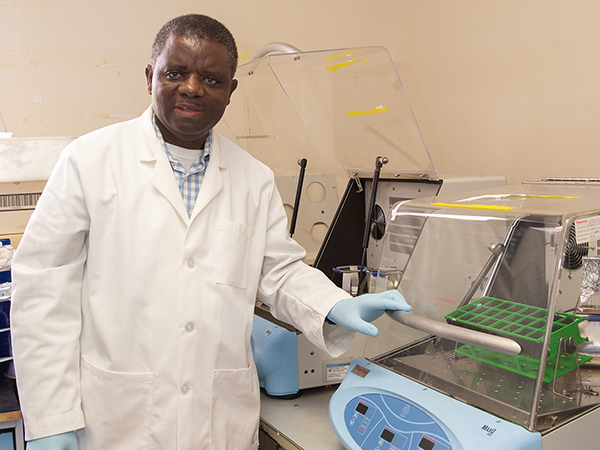CVM Researcher to Study Tick Vaccines in Brazil as Fulbright Recipient
Story by Margaret Preigh, CVMBS Communications

Dr. Albert Mulenga, a professor in the Texas A&M College of Veterinary Medicine & Biomedical Sciences’ (CVM) Department of Veterinary Pathobiology (VTPB), will spend four months continuing his research on tick vaccines in Brazil thanks to a Fulbright award.
The prestigious award will support Mulenga’s research abroad, during which he will work alongside researchers in Porto Alegre, Brazil, at the University Rio Grande do Sul. In addition to his research, Mulenga will teach a course and advise a Brazilian graduate student who will be helping him conduct his research on tick vaccines.
Under the Fulbright Program, Mulenga is tasked with “increasing mutual understanding between the people of the United States and the people of other countries,” according to the J. William Fulbright Foreign Scholarship Board.
This directive ties in closely to what Mulenga, as an immigrant, feels his career represents.
“I represent what is possible in the United States,” he said. “When I came to this country, I started my career as a postdoctoral fellow, and now I’ve risen all the way to a professor and associate head of a department. Once you put your mind to it, you can achieve what you want.”
The Fulbright program is the largest and most diverse international exchange program; recipients are carefully selected on the basis of their leadership and contributions to society under the supervision of a 12-member presidentially appointed board.
Alumni of the program include 60 Nobel Laureates, 86 Pulitzer Prize winners, 74 MacArthur Fellows, and countless other bright and influential members of society.
Mulenga is both honored and humbled to join their ranks.
“These former recipients have gone into leadership positions, have done amazing things after the Fulbright,” Mulenga said. “The people who have gone through this program have benefited. I want to make sure that I take advantage of those opportunities.”
Dr. Ramesh Vemulapalli, Professor and Department Head of VTPB at the CVM, recommended Mulenga for the award and believes that Mulenga will find his place among previous recipients.
“Dr. Mulenga’s scholarly accomplishments are a result of his scientific creativity, tenacity, and hard work,” Vemulapalli said. “He represents the best of American values. We are very proud that he is recognized as a Fulbright Scholar.”
Mulenga’s research will be instrumental in improving cattle health in Brazil and the United States, the two leading beef producers globally. According to the Organization for Economic Co-operation and Development (OECD), global consumption of beef is 14.5 kg per person each year. As developing countries continue to grow economically, global meat consumption is expected to increase.
“Brazil’s cattle industry is huge,” Mulenga said. “Ticks and tick-borne disease are a very big impediment, so they are trying to find solutions. Coming from Texas, it’s a win-win. If I’m successful in this project, the data could be directly applicable here.”
Currently, Mulenga is conducting research to develop a vaccine against cattle fever ticks under Kleberg Foundation support. This builds on his National Institutes of Health-funded research to understand how the Lonestar tick and the blacklegged tick transmit human tick-borne diseases. He believes that insight gained from his Fulbright project in Brazil will also translate to this ongoing study.
The new vein of research Mulenga will undertake in Brazil will investigate a novel way to empirically evaluate antigens for new tick vaccines. Current vaccine development models involve first selecting an antigen, then building a vaccine off of that molecule.
His research in Brazil will be unique in that he will be allowed to work in much closer proximity to these ticks than United States regulations would allow.
“There is a big benefit because, in Brazil, I can directly observe cattle fever parasites,” he said. “My collaborator in Brazil is allowed to work with infected ticks; I’m not allowed. With uninfected or infected ticks, we are restricted to working in a quarantine zone between the border of Texas and Mexico.”
Though Mulenga’s research and work as an ambassador will build off of his previous experiences, he looks forward to combining his strengths in research and communication to act as an academic representative of our country.
“At a scientific meeting, I’m just focused on my research,” he said. “Under this program, I also have to communicate the values that allowed me to come to this country and become a member of this society, do my work, and be able to get this award.”
###
For more information about the Texas A&M College of Veterinary Medicine & Biomedical Sciences, please visit our website at vetmed.tamu.edu or join us on Facebook, Instagram, and Twitter.
Contact Information: Jennifer Gauntt, Director of Communications, Texas A&M College of Veterinary Medicine & Biomedical Sciences; jgauntt@cvm.tamu.edu; 979-862-4216


